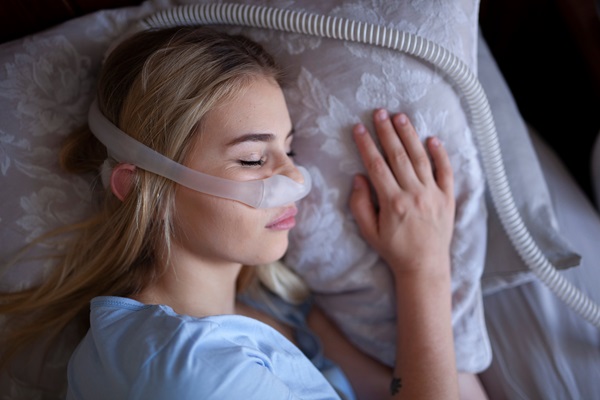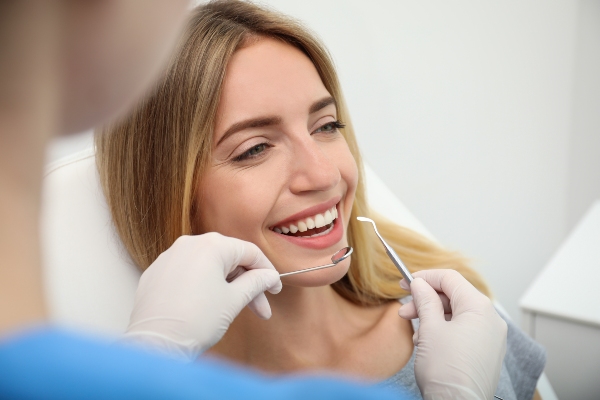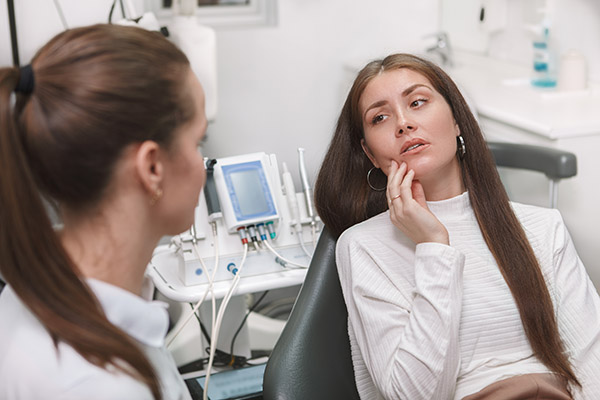Sleep Apnea Treatment Options From a Dentist

Sleep apnea affects tens of millions of American adults. Without an effective treatment solution, obstructive sleep apnea can cause symptoms that affect the patient negatively at night and throughout each day. The good news is that there are effective treatment solutions for sleep apnea. In this review, we discuss the most popular options from a dentist.
What are the most popular sleep apnea treatments from a dentist?
Many people know that CPAP machines can be used to treat sleep apnea. However, there are alternative machines, therapies, appliances, medications, and procedures that can also help treat sleep apnea. The most popular treatments available to patients from a dentist include CPAP machines, alternative machines, and oral appliances.
CPAP machines
CPAP stands for continuous positive airway pressure, and the machines are among the most popular forms of sleep apnea treatment. They are commonly prescribed and recommended by doctors, though some dentists may recommend them in certain situations. That said, many patients visit a dentist seeking an alternative to CPAP machines, as they can be inconvenient, uncomfortable, and ineffective in many cases.
A CPAP machine works by continually providing the patient with air throughout the night. Air is pulled from the room and filtered through the machine. This keeps the patient's airways open, which eliminates many (if not all) of the symptoms of sleep apnea. The downside to CPAP machines is that they are large and often uncomfortable and inconvenient.
Oral appliance therapy
Oral appliance therapy involves the use of a dental mouthguard that holds the tongue in the proper place to reduce the risk of an airway blockage. It effectively keeps the air passageway open during sleep, reducing the patient's risk of gasping for air as their airway closes, which is one of the most common symptoms of sleep apnea. It can also help prevent snoring. Since the patient remains asleep throughout the night, it also helps reduce other sleep apnea symptoms, such as daytime fatigue, irritability, lack of focus and concentration, etc.
Oral appliances from a dentist are customized for the most optimal fit and comfort while the patient sleeps. Many patients who switch from CPAP machines to oral appliance therapy report a more comfortable experience. Also, oral appliances for sleep apnea are smaller and therefore, easier to travel with and more convenient.
Alternative treatment options
Oral appliances are the primary recommendation for patients with mild to moderate cases of sleep apnea. But in rare cases, dentists may recommend alternative sleep apnea treatment options for patients who do not find relief and comfort from an oral appliance or even a CPAP machine. These may include:
- Alternative sleep apnea machines
- Medications
- Hypoglossal nerve stimulation
- Positional therapy
- Surgery
Anyone who is dealing with sleep apnea should contact their dentist to discuss all available treatment options. A personalized approach is always strongly encouraged, as no two patients are the same.
How to choose the best sleep apnea treatment option
Ultimately, the best sleep apnea treatment option depends on the patient's preference, the severity of their sleep apnea symptoms, the treatments that they have tried in the past (and how effective they have been), and the dentist’s recommendation. Most patients find the relief that they need from customized oral appliances from their dentist. CPAP machines may be an option for individuals who do not travel much and are not bothered by the machine while sleeping.
What to expect during a dental consultation for sleep apnea
The dental staff may begin by assessing the patient's reported symptoms and reviewing their treatment history. This will enable them to make a more informed recommendation. If the patient decides on an oral appliance for sleep apnea treatment, the dentist may take a mold impression of their mouth, which will be used to customize their sleep apnea mouthguard in the laboratory. If the patient also has any oral health concerns or it has been six months since their last cleaning visit, the dentist may first recommend a check-up and routine dental cleaning. Additional treatments may be recommended based on the patient’s unique needs and treatment goals.
Are you dealing with symptoms of sleep apnea?
Are you considering sleep apnea treatment? If so, look no further than our dental practice. We take genuine appreciation and pride in helping our patients overcome their sleep apnea symptoms with a personalized treatment solution. Contact us today to learn more and schedule a visit for sleep apnea treatment.
Request an appointment here: https://drdavidbrumbaugh.com or call R. David Brumbaugh, DDS at (214) 306-4402 for an appointment in our Dallas office.
Check out what others are saying about our dental services on Yelp: Do I Have Sleep Apnea in Dallas, TX.
Related Posts
Sleep apnea disrupts breathing during sleep and increases the risk of daytime fatigue, headaches, and cardiovascular strain. A general dentist evaluates airway health during routine visits and identifies red flags such as snoring, grinding, and jaw crowding. When appropriate, the dentist collaborates with a physician to confirm a diagnosis, then offers practical options, often an…
Sleep apnea is a disorder in which your breathing stops and starts periodically throughout sleep. When this occurs, your body awakens you and tells you to start breathing again. Repeated sleep disturbances make it harder to sleep properly, and you will be especially fatigued throughout the day.Sleep apnea affects you beyond daytime fatigue. Without treatment,…
You probably have heard about sleep apnea, but there may be aspects of this condition that you do not understand. It can be a serious problem and may affect your overall health if you do not treat it. Many people who struggle with it may search for answers from a general physician. While this can…
If you are struggling with sleep apnea, you need to address the condition right away. This is not an issue that will generally go away on its own. It is also a serious problem that can lead to severe health challenges. Luckily, your dentist is a good resource to turn to for help. Your dentist…


